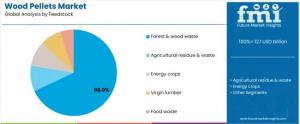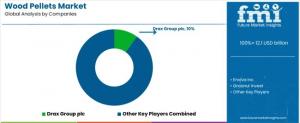Wood Pellets Market to Reach USD 31.1 Billion by 2035, Driven by Clean Energy Transition Across APAC, Europe, USA & KSA
Residential/Commercial Heating will dominate with a 38.0% market share, while forest & wood waste will lead the feedstock segment with a 68.0% share.
NEWARK, DE, UNITED STATES, November 11, 2025 /EINPresswire.com/ -- The global wood pellets market is on a robust upward trajectory, projected to expand from USD 12.1 billion in 2025 to USD 31.1 billion by 2035, registering a compound annual growth rate (CAGR) of 9.9%. This surge is attributed to intensifying decarbonization initiatives, growing renewable heating demand, and widespread adoption of biomass as a sustainable energy alternative across major regions including Asia Pacific (APAC), Europe, the United States, and Saudi Arabia.
Over the next decade, the market’s evolution will be underpinned by the convergence of environmental regulations, energy diversification goals, and industrial decarbonization mandates. The shift from fossil fuels toward carbon-neutral bioenergy has accelerated the global demand for wood pellets — a compact, high-energy fuel derived from renewable biomass materials such as wood chips, sawdust, and forestry residues.
Strong Growth Momentum from 2025 to 2035
Between 2025 and 2030, the market is expected to gain nearly USD 7.6 billion, driven by expanded certified pellet manufacturing facilities, technological improvements in drying and densification processes, and surging demand from the residential and small commercial sectors. During this period, several countries are expected to tighten emissions targets and provide subsidies for renewable heating systems, further supporting pellet adoption.
Request the complete report to gain a clear understanding of regional growth patterns, innovation trends, and competitive intelligence! Request Sample Report: https://www.futuremarketinsights.com/reports/sample/rep-gb-11094
From 2030 to 2035, the market will experience accelerated growth, adding approximately USD 11.6 billion, as utility-scale biomass conversions gain traction across Europe and North America. Pellet-based combined heat and power (CHP) facilities and bioenergy integration into district heating networks are expected to be key contributors to long-term expansion.
The wood pellets industry is also witnessing rapid advancements in feedstock optimization, sustainable forestry management, and pellet certification standards such as ENplus, ensuring product quality, sustainability, and consistency for both domestic and export markets.
Key Market Segments
- Feedstock Dominance: Forest and wood waste remains the leading feedstock category, accounting for approximately 68% of global production in 2025. Sustainable sourcing and utilization of forestry by-products are enabling producers to maintain cost competitiveness while minimizing environmental impact.
- Application Insights: The residential and commercial heating segment represents the largest end-use category, contributing to 38% of overall demand in 2025. Pellet boilers and stoves continue to replace traditional heating systems in homes and small businesses, particularly across Europe and parts of APAC.
Meanwhile, industrial and utility-scale power generation is rapidly emerging as the fastest-growing segment. The replacement of coal-fired systems with pellet-based co-firing and full conversions are creating new opportunities, especially within regulated European and U.S. energy markets.
Regional Outlook
Asia Pacific (APAC):
The APAC region is expected to record significant growth, fueled by policy-driven energy diversification and increasing biomass utilization.
- Japan continues to be one of the largest importers of wood pellets for power generation, driven by the government’s renewable portfolio targets.
- South Korea has made strong commitments to expand pellet-based energy supply to meet its 2030 carbon reduction goals.
- India is rapidly emerging as a promising market due to rising awareness of clean heating solutions and the government’s focus on rural bioenergy programs.
Together, these nations are reshaping the global trade dynamics for pellets, increasing inter-regional exports and demand for sustainable pellet supply chains.
Europe:
Europe remains the most mature and dominant regional market, supported by stringent climate policies and established pellet infrastructure.
Countries like Germany, Sweden, Finland, and the United Kingdom are driving large-scale adoption through their national renewable energy frameworks.
District heating networks, widespread consumer awareness, and strict carbon emission compliance standards have strengthened the region’s leadership position, accounting for over 55% of global consumption in 2025.
By 2035, Europe’s pellet usage in both heating and utility sectors is projected to double, supported by continued government incentives, carbon pricing mechanisms, and the integration of smart energy systems with bio-based fuels.
United States (USA):
In the United States, the wood pellets market is expanding rapidly due to strong domestic heating demand and export growth to Europe and Asia.
The U.S. has become a major exporter, with southern states such as Georgia, Mississippi, and Louisiana hosting large-scale pellet manufacturing facilities.
Federal and state-level clean energy initiatives, alongside modernized biomass conversion projects, are enhancing pellet utilization in both industrial and residential applications.
Furthermore, the U.S. is witnessing significant R&D investments in next-generation pellet technologies, emphasizing carbon accounting and lifecycle emission tracking.
Saudi Arabia:
The Kingdom of Saudi Arabia is making strategic moves toward biomass integration as part of its Vision 2030 sustainability agenda.
The focus on energy diversification, waste-to-energy projects, and carbon-neutral industrial development has sparked interest in biomass and pellet applications.
Government-backed green energy programs, coupled with infrastructure modernization, are expected to open new opportunities for pellet adoption in district heating, construction, and industrial energy systems.
Gain complete access to the report for extensive coverage of market forecasts, competitive benchmarking, and evolving industry trends! Buy Full Report: https://www.futuremarketinsights.com/checkout/11094
Market Drivers and Emerging Trends
The global wood pellets market is being reshaped by a combination of regulatory, technological, and environmental factors:
- Decarbonization and Policy Support: Governments worldwide are tightening carbon neutrality goals, creating favorable conditions for pellet utilization as a renewable alternative to fossil fuels. Subsidies for pellet boilers and heating systems, especially in Europe and Japan, continue to boost consumption.
- Technological Advancements: Innovations in drying, pelletizing, and storage technologies are improving fuel quality and energy efficiency. Automation and IoT integration in production facilities are reducing operational costs and enhancing traceability.
- Sustainable Feedstock Management: Increased focus on circular bioeconomy models and forestry residue utilization supports sustainable pellet production. Certification programs are ensuring traceable, low-carbon feedstock sources.
- Expanding Trade Networks: International trade in wood pellets is set to rise significantly, with North American suppliers catering to Europe and Asia, while emerging markets in the Middle East explore localized pellet supply chains.
Exploring Insights Across Emerging Global Markets:
Asia Neopentyl Glycol (NPG) Market: https://www.futuremarketinsights.com/reports/asia-neopentyl-glycol-market
Acoustic Insulation Market: https://www.futuremarketinsights.com/reports/acoustic-insulation-market
Polymer Fillers Market: https://www.futuremarketinsights.com/reports/polymer-fillers-market
Krypton Gas Market: https://www.futuremarketinsights.com/reports/krypton-gas-market
About Future Market Insights (FMI)
Future Market Insights, Inc. (FMI) is an ESOMAR-certified, ISO 9001:2015 market research and consulting organization, trusted by Fortune 500 clients and global enterprises. With operations in the U.S., UK, India, and Dubai, FMI provides data-backed insights and strategic intelligence across 30+ industries and 1200 markets worldwide.
Why Choose FMI: Empowering Decisions that Drive Real-World Outcomes: https://www.futuremarketinsights.com/why-fmi
Sudip Saha
Future Market Insights Inc.
+18455795705 ext.
email us here
Legal Disclaimer:
EIN Presswire provides this news content "as is" without warranty of any kind. We do not accept any responsibility or liability for the accuracy, content, images, videos, licenses, completeness, legality, or reliability of the information contained in this article. If you have any complaints or copyright issues related to this article, kindly contact the author above.


